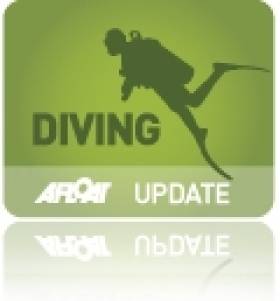Displaying items by tag: Professional Association of Diving Instructors
Passion for the Water Not Hindered by Disability
Physical disability does not have to be a barrier to enjoying marine activities, says one wheelchair user who's recently qualified as a scuba dive instructor.
Gary Allen, who has spina bifida, tells The Irish Times how he refused to let his disability get in the way of his passion for the water.
Allen, who lives in Co Galway, first got involved in sailing four years ago at an event in Kinsale hosted by the Irish Disabled Sailing Association - and was soon at the helm of his own refurbished trimaran specially adapted for disabled users.
His interest in scuba diving was piqued after a talk by Scotsman Fraser Bathgate, who qualified as the world's first wheelchair-using diving instructor. Allen later trained under Bathgate with members of the Galway Dive School.
“The sensation of absolute weightlessness which I experienced on my first scuba-dive is something that I don’t think I will ever forget,” says the Roscommon native.
By 2009 Allen was ready to make his first coastal dive, and in August last year he secured his Professional Association of Diving Instructors (Padi) certificate.
The Irish Times has more on Allen's inspiring story HERE.
Professional Association of Diving Instructors
Professional Association of Diving Instructors – PADI
PADI is the world’s leading scuba diving training organisation.
With more than forty years experience and 5,300 dive shops and resorts worldwide, PADI training materials and services let you experience scuba diving from nearly anywhere.
Scuba diving with PADI Instructors, Dive Centers and Resorts can help transform your life through education, experience, equipment and environmental conservation.
The PADI Story – Two Friends, a Bottle of Scotch and an Idea
It’s hard to believe that the world’s largest scuba diving training organisation was dreamt up by two friends in Illinois over a bottle of Johnny Walker in 1966.
PADI Co-Founders, John Cronin, a scuba equipment salesman for US Divers, and Ralph Ericson, an educator and swimming instructor, were concerned about the scuba diving industry. They felt that the current scuba certification agencies were unprofessional, didn’t use state of the art instruction and made it unnecessarily difficult for people to enter the sport. John and Ralph knew there had to be a safer, easy way for people to learn to breathe underwater.
In 1966, John brought a bottle of Johnnie Walker Black Label and thirty dollars to Ralph’s Illinois apartment in Morton Grove. They decided it was time to start a scuba training organization. John insisted that the word ‘professional’ be in the name of the company. Ralph wanted an ‘association of diving instructors.’ After a few drinks, the acronym PADI was born.
The goal: Give more people a chance to enjoy the underwater world by offering relevant, instructionally-valid scuba diving training to create confident scuba divers who dive regularly.
In the early years, PADI grew slowly. By the late 1960s, PADI had 400 members and it was still a struggling entity. John Cronin had been promoted to Sales Manager at US Divers and had moved the family to Huntington Beach, California.
Cronin went to a huge National Sporting Goods Association show in New York City. While he was there, he met with Paul Tzimoulis, who later became the editor of Skin Diver Magazine. Paul suggested that PADI put the diver’s picture on the certification card. That was a strategic move that helped PADI’s eventual global recognition.
Cronin and Erikson hired Nick Icorn from US Divers’ engineering team, who worked with Erickson to develop a modular training program for the PADI Open Water Diver course. It started to catch on.
In the late 1970s and early 80s PADI began creating its own integrated, multi-media student and instructor educational materials for each course. This development spawned an incredible growth period for PADI and made it unique from other agencies.
By the late 1980s PADI was the leading scuba diving training organization in the world. With so many new people introduced to the activity, PADI felt a responsibility to teach divers about their interactions with the underwater environment. PADI had worked very hard over the years to keep the scuba diving industry as free from legislation as possible. Cronin knew the organization had a responsibility to protect the marine environment or risk the government doing so. John Cronin said: "We want to feel that our children, their children and generations to come will be able to enjoy the underwater world that has given us so much. There are so many significant problems facing mankind, but as divers, this is truly our cause. If scuba divers do not take an active role in preserving the aquatic realm, who will?"
Out of a true concern for the environment, the Project AWARE Foundation was formed.
PADI co-founder John Cronin passed away in 2003. His friend and PADI co-founder, Ralph Erickson, also passed away three years later. They proudly carried PADI’s torch for many years before they confidently put it in the hands of today’s generation, who continue to introduce the world to scuba diving.
PADI has issued more than millions of scuba certifications worldwide. There are more than 5,700 PADI Dive Shops and Resorts worldwide.
With close to 400 employees in PADI corporate offices around the world, PADI works hard to be the best partner to its members and is committed to:
1 Safe and responsible diver acquisition and retention
2 Quality member acquisition and retention
3 Financial prosperity
4 Worldwide alignment in message, products, systems and procedures
There is a space for Irish boating clubs and racing classes to use as their own bulletin board and forum for announcements and discussion. If you want to see a dedicated forum slot for your club or class, click here





























































